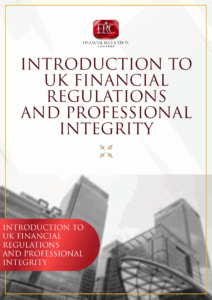Professional integrity is the cornerstone of the UK financial services industry. It underpins public trust, regulatory compliance, and the reputation of the sector. In a landscape where clients, stakeholders, and regulators expect high ethical standards, integrity is not optional — it’s essential.
In this guide, we explain the meaning of professional integrity in financial services, its impact on roles and organisations, and how it’s developed and measured through regulatory training — including the comprehensive Level 4 Financial Regulation and Professional Integrity certification.
What Is Professional Integrity?
Professional integrity refers to the consistent application of ethical principles, honesty, and accountability in professional decision-making. In UK financial services, it means putting clients first, being transparent, respecting regulations, and avoiding conflicts of interest.
Practising integrity means:
- Making fair and informed decisions
- Acting in the client’s best interest
- Disclosing conflicts and correcting errors
- Refusing to participate in or ignore unethical behaviour
These values are central to the Financial Conduct Authority’s (FCA) expectations for conduct and culture across the industry.
Why Integrity Matters in Financial Services
The financial sector is entrusted with managing people’s savings, investments, pensions, and access to credit. With this trust comes responsibility. When integrity fails, the consequences are significant: financial losses, legal sanctions, and reputational damage.
The 2008 financial crisis, mis-selling scandals, and recent conduct fines all illustrate what happens when integrity is compromised. The FCA has since prioritised culture and conduct as supervisory priorities.
In this context, professional integrity is more than a personal trait — it’s a risk control function. It mitigates misconduct, strengthens compliance, and enhances client confidence.
How Professional Integrity Is Taught and Assessed
Training in integrity must go beyond awareness — it must foster ethical reasoning and decision-making. That’s why certification programmes like the Level 4 Financial Regulation and Professional Integrity course are structured around scenario-based learning.
These programmes:
- Introduce the FCA Conduct Rules
- Use real-world case studies
- Encourage critical reflection on ethical dilemmas
- Include assessments requiring judgement rather than rote answers
Learners are challenged to demonstrate they can uphold ethical standards, even in complex or pressured situations.
For guidance on passing such assessments, explore How to Pass the Level 4 Financial Regulation and Integrity Exam.
How Integrity Links with Regulatory Expectations
The FCA requires firms and individuals to act with integrity under its Principles for Businesses and Conduct Rules. Specifically:
- Principle 1: A firm must conduct its business with integrity
- Conduct Rule 1: You must act with integrity
These expectations apply to authorised persons, certified staff, and senior managers under the Senior Managers and Certification Regime (SMCR). Firms must ensure individuals are trained and monitored for integrity-related behaviours.
As such, integrity is not just a personal value — it’s an enforceable standard. Firms that fail to uphold it risk enforcement actions.
Integrity as a Professional Skill
While often viewed as a character trait, integrity is also a competency. It can be developed, reinforced, and modelled. For example:
- Managers set tone from the top
- Training builds ethical awareness
- Performance appraisals can include conduct criteria
- Internal reporting tools encourage honesty
Organisations that treat integrity as a performance area — not just a moral issue — are better able to promote consistent behaviour across teams.
Why Integrity Drives Long-Term Career Success
Professionals with integrity earn trust — from colleagues, clients, and regulators. This trust supports career progression and mobility across the sector.
For those in advisory, compliance, or governance roles, integrity is a key capability. Employers often look for it when hiring or promoting, especially into positions of responsibility.
Explore the Career Benefits of Studying Level 4 Financial Regulation in the UK to see how integrity contributes to advancement.
Who Needs to Demonstrate Professional Integrity?
While integrity is relevant to all staff, it is particularly critical for:
- Client-facing personnel
- Risk and compliance teams
- Auditors and control functions
- Managers and SMCR role holders
Professionals in these roles influence client outcomes, firm compliance, and internal culture. Their behaviour reflects on the organisation as a whole.
For more on identifying who should complete integrity training, visit Who Should Take the Introduction to UK Financial Regulation Course?.
Real-World Scenarios Where Integrity Matters
Some examples where professional integrity is tested in finance:
- A client advisor discovers they gave incorrect investment advice — do they correct it?
- A compliance officer notices colleagues ignoring a breach — do they escalate it?
- A manager is asked to prioritise sales over customer outcomes — do they push back?
Each scenario shows how ethical judgement can affect both immediate outcomes and long-term trust. Training must prepare professionals for these decisions.
How Level 4 Training Supports Professional Integrity
The Level 4 Financial Regulation and Professional Integrity course embeds integrity throughout its content and assessments. It prepares learners to:
- Interpret regulatory principles
- Recognise ethical risks
- Use sound judgement
- Prioritise customer and market fairness
The course is highly recommended for those looking to strengthen their ethical skills while aligning with FCA expectations.
If you’re unsure about committing to Level 4, this article may help: Is the Level 4 Financial Regulation Course Worth It in 2025?.
Bringing It All Together
Professional integrity is the foundation of trust in UK financial services. It supports fair client outcomes, regulatory alignment, and a healthy culture within firms.
Whether you’re an adviser, a compliance professional, or a manager, demonstrating integrity isn’t just about doing the right thing — it’s a core requirement of working in regulated finance.
To build and demonstrate this skill, formal training such as the Level 4 Financial Regulation and Professional Integrity certification offers powerful support.
Continue exploring how to develop your expertise by reviewing:
